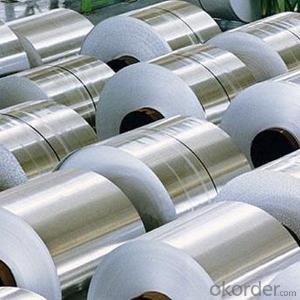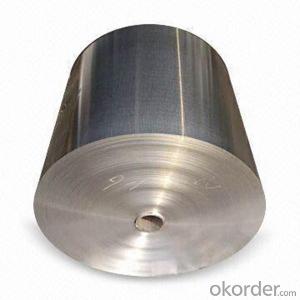Thin Aluminum Rolls Alloy used for Foil Stock
- Loading Port:
- Shanghai
- Payment Terms:
- TT OR LC
- Min Order Qty:
- 5 m.t.
- Supply Capability:
- 10000 m.t./month
OKorder Service Pledge
OKorder Financial Service
You Might Also Like
Item specifice
1. Specification of Thin Aluminum Rolls Alloy used for Foil Stock
characteristics | Application |
1) Super peeling strength | 1) Building exterior curtain walls |
2) Excellent surface flatness and smoothness | 2) Decoration and renovation additions for old buildings |
3) Superior weather, corrosion, pollutant resistance | 3) Decoration of interior walls, ceilings, bathrooms, kitchens and balconies |
4) Even coating, various colors | 4) Shop door decorations |
5) Fireproof, excellent heat and sound insulation | 5) Advertisement board display platforms and signboards |
6) Superior impact resistance | 6) Wallboards and ceilings for tunnels |
7) Lightweight and easy to process | 7) Industrial materials, materials for vehicles and boats |
2. Application of Thin Aluminum Rolls Alloy used for Foil Stock
(1).Interior: wall cladding, ceilings, bathrooms, kitchens and balconies, shutters, doors...
(2).Exterior: wall cladding, facades, roofing, canopies, tunnels,column covers , renovations...
(3).Advertisement: display platforms, signboards, fascia, shop fronts...
3. Feature of Thin Aluminum Rolls Alloy used for Foil Stock
*Such coil is specially designed to replace aluminum ingot, due to the high export tax of aluminum ingot, the coil has better price than ingot.
*This type of coil can fit customer's remelting furnace just like ingot, no need to make any change to the production line that was previously used for ingot. The standard coil size and weight is very suitable for the feed gate of furnace.
*This type of coil causes less material wastage than ingot when remelted.
*Our coil is made directly from ore, no need to go though the ingot making process, quality is much better than other suppliers who use ingot scrap to make coil.
Be free from Oil Stain, Dent, Inclusion, Scratches, Stain, Oxide Dicoloration, Breaks, Corrosion, Roll Marks, Dirt Streaks and other defect which will interfere with use
4. Certificate:
SGS and ROHS(if client request, paid by client), MTC(plant provided), Certificate of Origin(FORM A, FORM E, CO), Bureau Veritas and SGS (if client request, paid by client), CIQS certificate
5. Image of Thin Aluminum Rolls Alloy used for Foil Stock
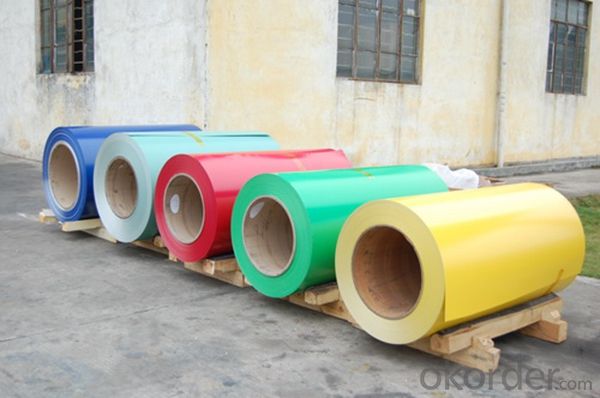
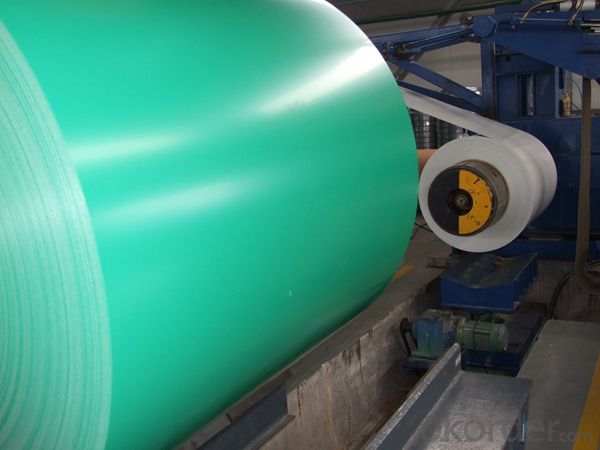
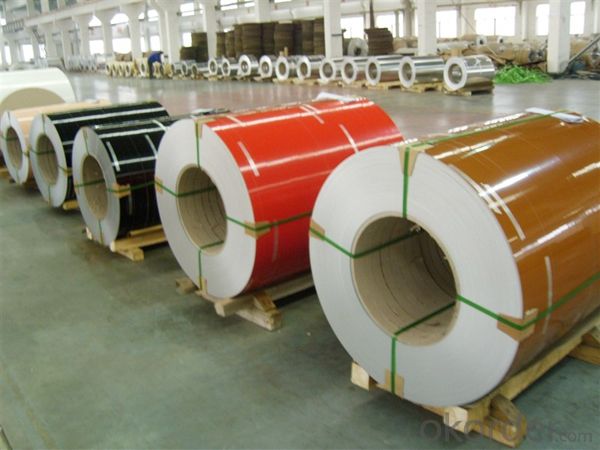
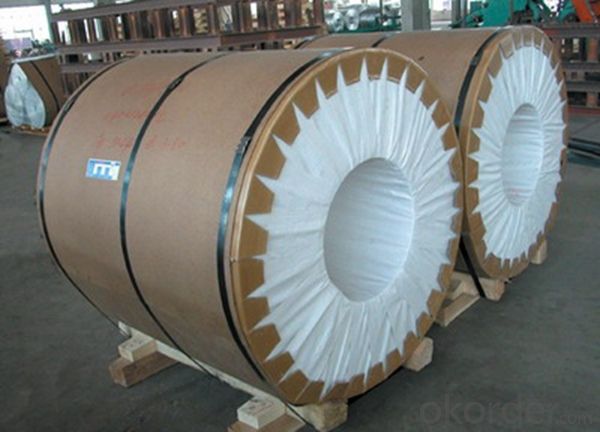
6. Package and shipping of Thin Aluminum Rolls Alloy used for Foil Stock
eye to wall
eye to the wall
with wood pallet (wooded case also available)
7. FAQ
1) What is the delivery time?
Dpends on actual order, around 20 to 35 days
2)What is the QC system:
We have QC staff of 20 persons and advanced equipment, each production is with MTC traced from Aluminum ingot lot.
3) What market do you mainly sell to?
Australia, America, Asia, Middle East, Western Europe, Africa etc
- Q:What is the typical thickness of an aluminum coil?
- The typical thickness of an aluminum coil can vary depending on its intended use and application. However, in general, aluminum coils range in thickness from 0.006 inches (0.15 mm) to 0.25 inches (6.35 mm). Thinner aluminum coils are often used for lightweight applications such as packaging materials, while thicker coils are commonly used in construction, automotive, and aerospace industries where strength and durability are essential. It is important to note that the specific thickness requirements may vary based on the specific needs and specifications of the project or product being manufactured.
- Q:Can aluminum coils be painted or coated?
- Yes, aluminum coils can be painted or coated. Aluminum is a versatile material that can be painted or coated with various finishes to enhance its appearance and protect it from corrosion. The process of painting or coating aluminum coils typically involves cleaning and preparing the surface, applying a primer, and then applying the desired paint or coating. The type of paint or coating used will depend on the desired finish and the intended application of the aluminum coil.
- Q:What are the electrical conductivity properties of aluminum coils?
- Aluminum coils are known for their excellent electrical conductivity. Among metals, aluminum is the second most conductive after copper. In fact, aluminum's conductivity is about 61% of copper's conductivity. This makes aluminum coils a popular choice when high conductivity is needed in electrical applications. The reason behind aluminum's electrical conductivity lies in its atomic structure. Aluminum atoms have a significant number of free electrons, which are responsible for the flow of electric current. These free electrons can easily move through aluminum's lattice structure, allowing for efficient electrical conduction. Additionally, aluminum has low resistance, resulting in minimal energy loss during electricity transmission. This makes aluminum coils a cost-effective option for electrical wiring, power transmission lines, and other applications that require efficient conductivity. It is worth noting that aluminum's electrical conductivity decreases slightly as temperature increases. However, this decrease is relatively small compared to other metals, making aluminum coils reliable even in high-temperature applications. To summarize, aluminum coils possess excellent electrical conductivity properties, making them suitable for a wide range of electrical applications. Their high conductivity, low resistance, and cost-effectiveness contribute to their widespread use in various industries.
- Q:What are the potential applications of coil-perforated aluminum coils?
- Coil-perforated aluminum coils have a wide range of potential applications due to their unique properties. They can be used in architectural and construction projects for decorative facades, sunscreens, and acoustic panels. Additionally, they find use in automotive manufacturing for radiator grilles and soundproofing components. The coils are also suitable for air filtration systems, HVAC equipment, and industrial machinery, thanks to their excellent airflow and heat dissipation capabilities. Overall, the potential applications of coil-perforated aluminum coils are extensive, offering versatility and functionality in various industries.
- Q:Can aluminum coils be used in the production of beverage cans?
- Yes, aluminum coils can be used in the production of beverage cans. Aluminum coils are commonly used because aluminum is lightweight, corrosion-resistant, and recyclable, making it an ideal material for beverage cans. The coils are typically formed into can bodies and lids, which are then further processed to create the final beverage cans.
- Q:How much does it cost to use fluorocarbon paint for aluminum coil roller coating?
- Fluorocarbon paint can be divided into fluorocarbon paint for exterior wall, aluminum fluorocarbon paint, metal fluorocarbon paint and steel structure fluorocarbon paint according to usages. It can also be divided into national standard product and non-national standard product according to industrial standards.
- Q:We want to buy an AirBake insulated aluminum pizza pan. What is insulated aluminum? We want to make sure that it is not something toxic like the non-stick material on pans.
- AirBake is available either natural (just plain aluminum) or nonstick, which is coated with a similar material to other nonstick cookware. What's insulated about it is this: The pan is actually two layers separated by an air pocket. If you put it directly over a heating element, the lower layer heats the air inside, which heats the upper layer. A single-ply aluminum sheet will get very hot and tend to burn the pizza, because it absorbs radiant energy from the element more quickly than the pizza can conduct it away. The insulating air layer slows down the heat transfer and helps to keep your pizza from burning. So if you prefer non-non-stick cookware, get the AirBake Natural line.
- Q:What is the average lifespan of an aluminum coil?
- The average lifespan of an aluminum coil can vary depending on various factors such as the quality of the aluminum, external factors like exposure to weather conditions or chemicals, and how well it is maintained. However, on average, an aluminum coil can last anywhere from 20 to 30 years.
- Q:What are the different grades of aluminum used in coil manufacturing?
- There are several different grades of aluminum used in coil manufacturing, each with its own unique properties and applications. The most commonly used grades include 1100, 3003, 5052, and 6061. - Grade 1100 is a commercially pure aluminum with excellent corrosion resistance and good formability. It is often used in chemical equipment, heat exchangers, and food handling equipment. - Grade 3003 is a non-heat treatable alloy with good corrosion resistance and moderate strength. It is commonly used in cooking utensils, roofing, and general sheet metal work. - Grade 5052 is a high-strength alloy with good formability and excellent corrosion resistance. It is frequently used in marine applications, such as boat hulls and components, as well as in automotive parts and appliances. - Grade 6061 is a heat treatable alloy with excellent strength and good machinability. It is commonly used in structural applications, such as aircraft parts, bike frames, and automotive components. These grades of aluminum offer a range of properties and characteristics, allowing manufacturers to choose the most suitable grade for their specific requirements in coil manufacturing.
- Q:How are aluminum coils cut to size?
- Aluminum coils are typically cut to size using specialized coil slitting machines. These machines have rotating circular blades that make precise cuts along the length of the coil. The coil is fed through the machine, and the blades cut the aluminum into the desired width. The cut pieces are then collected and further processed or used for various applications.
1. Manufacturer Overview |
|
|---|---|
| Location | |
| Year Established | |
| Annual Output Value | |
| Main Markets | |
| Company Certifications | |
2. Manufacturer Certificates |
|
|---|---|
| a) Certification Name | |
| Range | |
| Reference | |
| Validity Period | |
3. Manufacturer Capability |
|
|---|---|
| a)Trade Capacity | |
| Nearest Port | |
| Export Percentage | |
| No.of Employees in Trade Department | |
| Language Spoken: | |
| b)Factory Information | |
| Factory Size: | |
| No. of Production Lines | |
| Contract Manufacturing | |
| Product Price Range | |
Send your message to us
Thin Aluminum Rolls Alloy used for Foil Stock
- Loading Port:
- Shanghai
- Payment Terms:
- TT OR LC
- Min Order Qty:
- 5 m.t.
- Supply Capability:
- 10000 m.t./month
OKorder Service Pledge
OKorder Financial Service
Similar products
New products
Hot products
Hot Searches
Related keywords
